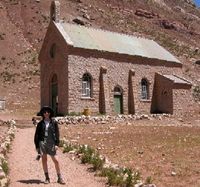The historical detective game
I'm not exactly sure why genealogy is so fascinating to so many people. Certainly, up until a few years ago, I found it very weird. I was always a bit curious about the American side of my family, but that was mostly because we are recent immigrants on that side. There is nobody alive who even knows the names of my great-grandparents, and in all likelihood I could never find out. I visited the museum at Ellis Island a few years back and tried to picture myself in the confused mass of people, a babel of languages, the fear and excitement and uncertainty of it all. I didn't need the facts of my family's story; it was enough to try to feel the shared experience of so many people coming to this country, or even to Argentina, or Brazil, or Canada.
With the other side of the family - the adventurous Rutabegas, with their far-flung travels and the mountains and towns named after them - it's a whole different story. So much of the historical record is there, waiting to be found! I can find pictures of my great-great grandparents on the Internet. I can hear them speak to me from the pages of books. And so, when I encounter a gap in the records, or a mystery, I want to know. I want to know how that little boy in the photograph died, just a few short months later. I want to know what kind of inhertance motiviated Julian Rutabega to break the world snowshoeing record just to change his name, halfway around the world. I want to know what happened to my great-great-aunt's journal, potentially holding answers to these questions, but seemingly vanished into the mists of time.
Moxie and I have decided, upon consultation with our wise aunt in the north, to write our book as historical fiction. This allows us to take advantage of interesting historical background that might not line up exactly with our story. And more importantly, it allows us to write from the standpoint of the women, who are not so well represented in the historical record as the men, but whose stories fascinate us.
Thus I returned from Edmonton ready to write. But I needed some background help, because writing fiction requires the ability to describe your setting. So young Sarah wakes up one morning in Red River Settlement, poised to go out in the world and meet her future husband. What does she wear? What does she have for breakfast? What chores are assigned to her?
To help me with this, I picked up a few books from the university library, which holds a surprising wealth of relevant material. A book of first-hand reminiscences from 1923, entitled "Women of Red River: Being a Book Written from the Recollections of Women Surviving from the Red River Era," seemed like just the ticket. And sure enough, it was filled with just the sort of detail I require. What they burned in their lamps. How they made cheese (using calf stomachs in lieu of cheesecloth, in case you wondered). What they wore, and learned in school, and did for entertainment during the long winter evenings. It's all there.
And then, on page 167, unexpectedly, the voice of my great-great-grandmother herself. Talking about many things, including a difficult journey back home to the far north from Winnipeg, when all four of her young children came down with whooping cough. "I was in great distress for the poor children, and found it hard to relieve their sufferings. That journey was one of hardship, I will admit. I never knew greater kindness than the boatmen showed in doing everything they could to make it easier for us. And when at last we got to the mission of the French sisters...the sisters took us in, and made the children comfortable. My little boy who was two years old died there, and is buried there."
And so, by sheer chance, I learn how the little boy in the picture dies, a few short months later. He dies of whooping cough, far from home, in the care of the French sisters. This, then, is why people love genealogy, the great historical detective game. It is hardly interesting to anyone else, but as soon as the people step out of time and become real to you - you're hooked.

No comments:
Post a Comment